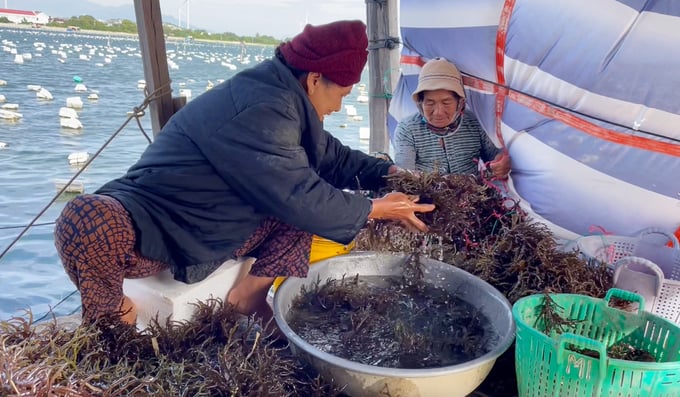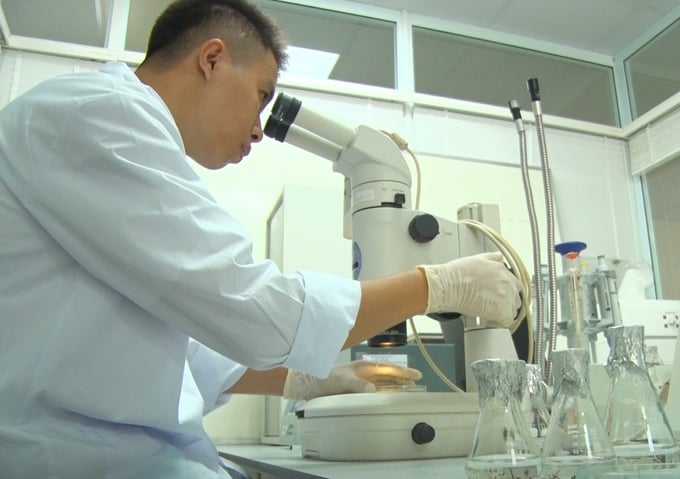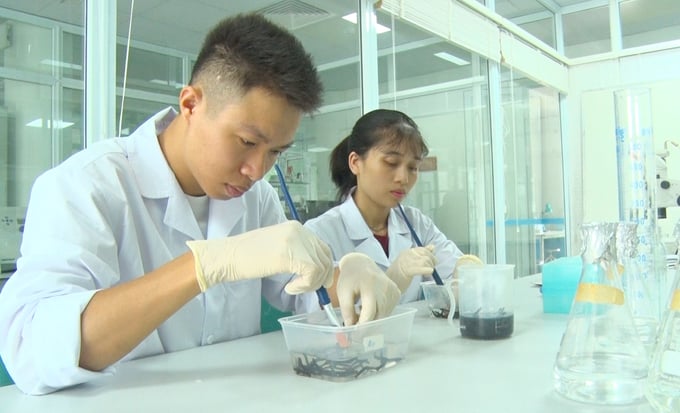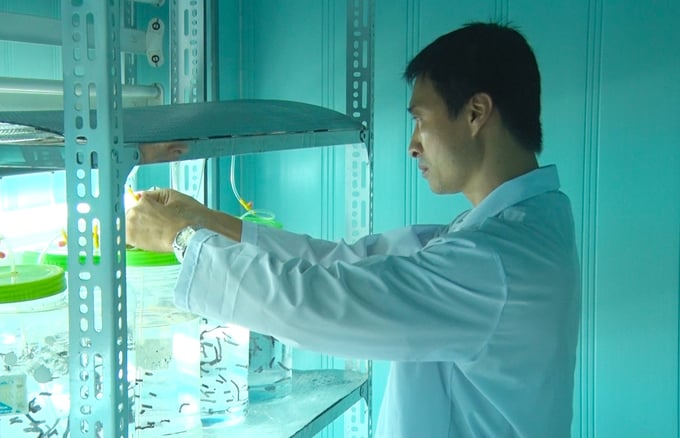May 30, 2025 | 17:44 GMT +7
May 30, 2025 | 17:44 GMT +7
Hotline: 0913.378.918
May 30, 2025 | 17:44 GMT +7
Hotline: 0913.378.918

Seaweed has provided a stable livelihood for many coastal households for over 20 years. Photo: Dinh Muoi.
Kappaphycus alvarezii is a tropical seaweed species that holds significant economic value. It is primarily used as a key raw material in the production of k-carrageenan, which is a type of hydrocolloid. K-carrageenan is extensively utilized in various industries, particularly in the adhesive and binding agent industry.
In Vietnam, Kappaphycus alvarezii was imported from the Philippines in 1993 and has been cultivated in coastal provinces of Central Vietnam, such as Khanh Hoa, Binh Dinh and Ninh Thuan. This has developed into a thriving industry, providing a stable livelihood for poor coastal communities over the long term.
However, in recent years, the seaweed farming industry has been facing a gradual decline. This downturn can be attributed to several factors, including environmental pollution and the effects of climate change. Additionally, the deterioration of seaweed seed stocks caused by prolonged periods of vegetative cultivation has significantly impacted the vitality and quality of Kappaphycus alvarezii in Vietnam.

Scientists at the Marine Biotechnology Research Laboratory (Research Institute for Marine Fisheries) are studying the breeding technology process for seaweed. Photo: Dinh Muoi.
According to Dr. Le Thanh Tung, Head of the Marine Biotechnology Research Laboratory at the Research Institute for Marine Fisheries, seaweed has high commercial value. Since its introduction and cultivation in Vietnam, it has generated significant economic benefits and provided sustainable livelihoods for farmers for nearly 20 years.
However, in the cultivation process, Kappaphycus alvarezii is unable to reproduce sexually in the marine waters of Vietnam. Consequently, local farmers typically resort to vegetative propagation methods to conserve and propagate the seaweed. This approach allows them to maintain a stable supply for subsequent seasons.
Consequently, over an extended period, the quality of Kappaphycus alvarezii has deteriorated, resulting in slower growth rates and a decline in both the quantity and quality of carrageenan produced by the seaweed. In light of this concerning situation, the Ministry of Agriculture and Rural Development has assigned the Research Institute for Marine Fisheries the responsibility of conducting comprehensive research. This effort has led to the successful development of high-quality seaweed through a scar tissue culture process.

The research was conducted meticulously and with great attention to detail. Photo: Dinh Muoi.
Dr. Le Thanh Tung and scientists at the Research Institute for Marine Fisheries have successfully restored the genetic source of Kappaphycus alvarezii, producing high-value seedlings through the embryogenic development process. The seedlings generated from this new genetic source exhibit higher yields, excellent disease resistance, and faster growth rates compared to naturally occurring seedlings.
Despite these advancements, the newly produced seedlings encounter a significant challenge: the process still requires a long time to complete. Typically, it takes about 12-15 months to fully develop the seedlings before they can be supplied to farmers.
In order to overcome this challenge, Dr. Le Thanh Tung and his colleagues have persisted in their research efforts, implementing advanced methods for the rapid propagation of Kappaphycus alvarezii using high-quality parent plants. They have now successfully mastered the technology required for producing and rapidly multiplying this seaweed, effectively meeting the demands for large-scale production.

Scientists at the Research Institute for Marine Fisheries have mastered the technology and are now able to proactively produce high-quality seaweed seedlings in large quantities. Photo: Dinh Muoi.
Up to now, the Research Institute for Marine Fisheries has successfully mastered the technology for producing high-quality marine seaweed seedlings in large quantities using a plant tissue culture process.
These high-quality seedlings serve as essential materials for developing seed stock, facilitating production through both rapid propagation and vegetative regeneration methods. This enables large-scale, intensive cultivation aimed at commercial purposes
"We propagate and generate seedlings through a branching process. Remarkably, this method only takes about 3 to 4 months, and in certain instances, it can be completed even more quickly. This allows us to produce high-quality seaweed seedlings that effectively support farmers in their large-scale production in the coastal provinces of Central Vietnam", Dr. Le Thanh Tung elaborated.
According to Master Pham Thi Mat, a researcher at the Marine Biotechnology Research Laboratory (Research Institute for Marine Fisheries), the process of propagating seaweed using tissue culture technology has been studied and refined to improve efficiency, reducing the time from 240 days to less than 150 days. All steps in the process have been researched and enhanced, including adapting materials in the laboratory, sterilizing to create clean scar tissue, and regenerating embryos to produce seedlings.
Translated by Phuong Linh

(VAN) Several scientists and farmers are experimenting with soil treatment in some key durian-growing regions such as Cai Lay (Tien Giang), Dak Song, Gia Nghia, and Dak R’lap (Dak Nong).
/2025/05/25/4127-3-073637_820.jpg)
(VAN) Thanks to the promotion from an FAO-implemented project, vegetable production in greenhouses in Moc Chau has seen strong development, from 1.5 hectares in 2021 to nearly 50 hectares in 2024.

(VAN) FAO has recently supported USD 140,000 to implement the project 'Risk mitigation human-animal interface risks through disease control initiatives in pig farming.'

(VAN) The People's Committee of Tra Vinh province has approved an adjustment to the investment policy for the Green Hydrogen Plant project, increasing its area to approximately 52.76 hectares.
![Reducing emissions from rice fields: [2] Farmers’ commitment to the soil](https://t.ex-cdn.com/nongnghiepmoitruong.vn/608w/files/news/2025/05/05/dsc08881jpg-nongnghiep-140632.jpg)
(VAN) Clean rice cultivation model in Thuong Tan commune, Bac Tan Uyen district, is assisting local residents in achieving sustainable agriculture by substantially reducing costs, increasing productivity, and protecting the environment.

(VAN) At the conference to disseminate Resolution No. 68, AgriS introduced its digital agricultural ecosystem and reaffirmed its commitment to accompanying the Government in promoting private sector development and sustainable agriculture.

(VAN) 'Blue Ocean - Blue Foods' initiative is designed to restore marine ecosystems and establish sustainable livelihoods for local communities by cultivating a minimum of 1,000 hectares of cottonii seaweed in the first three years.